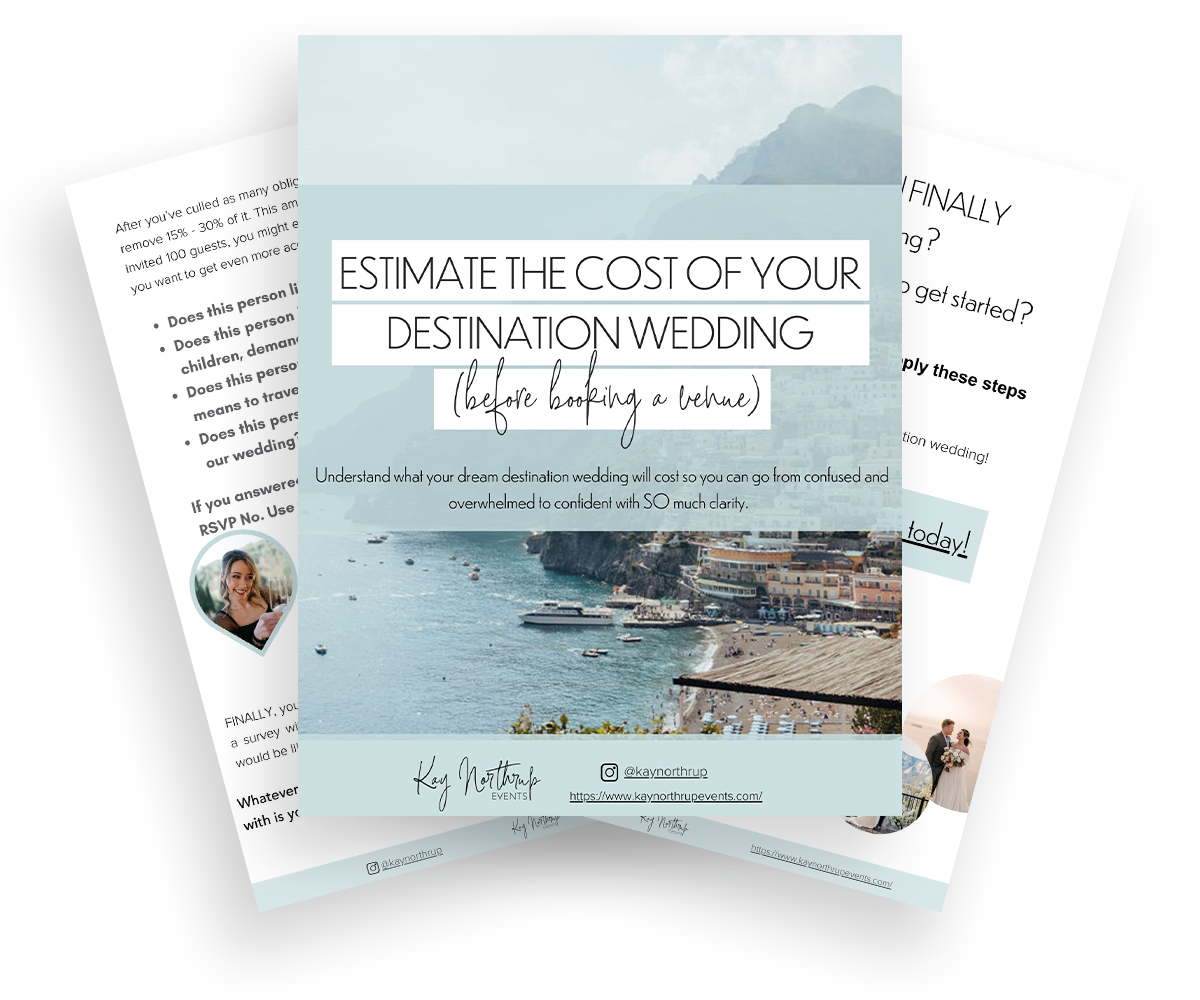How to Plan a Destination Wedding: the Do’s and Don’ts
Photo by Kerri Carlquist Photography
Destination weddings are on the rise as more couples are discovering a multi-day, experience-rich international wedding is the same cost as a local cookie cutter one. If you’re looking to go big or go home for your wedding, an international destination can make quite the splash. And since destination weddings are kind of our thing, we’re happy to see more couples take life by the balls and actually do it!
Well, as if wedding planning wasn’t complicated enough, try transplanting the entire affair to a foreign land! A destination wedding is an unforgettable experience for you, your future spouse, and all of your guests—but here are some practical Do’s and Don’ts to keep in mind before renewing your passport.
Do: Determine who your must-have guests are, and be sure that they’d be able to make the trip.
Do you have immediate relatives that are sick or can’t travel? Maybe a parent or cousin has flight anxiety and could never bring themselves to do it. Talk it through with your closest loved ones and make sure you understand the circumstances that would make it impossible for them to join you.
Don’t: Be angry if you get a lot of “No” RSVPs.
For local celebrations, it’s common to expect about a 15% drop-off from your invite list. For destination weddings, it can be upwards of 50% (sometimes more). Having those conversations with your must-haves upfront can alleviate some disappointment, but be prepared for the unexpected and unavoidable drop-off.
Do: Try to make invitees who declined feel special.
It’s important to reiterate to guests who RSVP “No” that you are not mad at them or trying to exclude them from celebrating with you. Host a local engagement party, wedding send-off, or post-wedding reception where they can celebrate with you instead.
Don’t: Spring this on your guests last minute.
Traveling domestically or internationally can take a toll on your wallet. It’s courteous to give guests at least a one-year notice so they have the appropriate time to save money and plan for time-off. If most of your friends are attending (and spending money on) multiple weddings a year, a two-year notice is even better. Often times they’ll need to block off not just your wedding date, but extended time before and after for travel.
Do: Keep in mind exchange rates and V.A.T (value-added tax).
On paper, traveling outside the United States to a country where the US dollar is stronger than local currency sounds like a DEAL. Sometimes, it is—but, when considering how to plan a destination wedding, don’t forget there can be fees associated with exchanging money and added taxes for tourists. In Greece, for example, you can expect a 24% increase on vendors due to the V.A.T alone. Not to mention money exchange fees at banks and international transaction fees. Since you will probably be wiring most of your payments to foreign banks, be prepared for those transaction fees as well. If you can, elect to pay larger and less frequent deposits when wiring money to avoid excessive fees from your bank. Do some research on the countries you’re considering and make sure to put some of the budget aside for these considerations.
Don’t: Wire money to a foreign vendor without a signed contract.
Just. Don’t. Do. It. If it isn’t customary in your destination for vendors to require signed contracts, insist they make an exception and draw something up for you. Before every payment, make sure to confirm the wire instructions and bank information. If at any point those details change, hop on a video call with the main contact you initially booked with and confirm the change face to face.
Do: Arrange for a site visit (or virtual one!) to meet all vendors and visit venues before your wedding day.
If you can do this before you book them, even better. At the very least, do your research on vendors before booking, or have an experienced planner do it for you. Ask your venue or solidified vendor that you trust for their recommendations on the best vendors in their area. You don’t want any surprises!
Don’t: Rush the planning process.
If you’re wondering how to plan a destination wedding, but have little time to actually plan, consider hiring an experienced planner who has worked abroad before. Language barriers and cultural differences can slow down the usual planning process. Be mindful of your destination’s local or religious holidays, slow versus high seasons and of course, the time difference! If you can, set aside over 12 months for the planning process.
Do: Be clear on the full wedding weekend schedule with guests as soon as possible.
Make sure to inform your wedding party about timing for the ceremony rehearsal the day before as well. Encourage anyone involved in the wedding to arrive at least two days before to protect against any canceled or missed flights and acclimate to the time change.
Don’t: Stress out over a language barrier between you and your destination’s venue/vendors.
Remember, you may or may not be communicating in your destination’s native language. It’s imperative to show your international vendors kindness and patience, just as they will show you. If you’re having a hard time communicating, consider hiring a planner who can act as a liaison between you and your vendors to avoid confusion. If hiring local help is out of budget, try switching up your method of communication. Video conferencing can be faster and easier to understand each other than emailing. Schedule a recurring video call that works well with both of your time zones, and always show gratitude—you’re the one going to them for their services, after all!
Do: Arrive as early as you and your fiancé can to your destination.
After months of planning your destination wedding, arrive a few days before to begin acclimating to the time change, meet your vendors one last time, submit final payments and RELAX. Plan a couple’s massage and mani/pedi at your hotel spa to put you in bridal bliss. Set aside time for you and your future spouse to enjoy the last few hours of being engaged and take in the beauty of the destination you painstakingly researched for months.
Don’t: Store your dress in the overhead bin on the plane. I beg you.
Picture unknown red liquids leaking onto your garment bag from the carry-on stowed next to it in the overhead bin…it’s happened. Believe it or not, flight attendants are very accommodating when you walk onto a plane with a wedding gown. As you enter the plane, inform them you have a gown that you would like to stow in their personal closet at the front of the plane. Before parting with your dress, make sure it’s in a waterproof garment bag and labeled with your name. If the flight attendant doesn’t have a closet on board, hold the dress in your lap for the flight and skip any in-flight coffee. And if this wasn’t already obvious—DON’T put your dress in a checked bag (do you really want to risk the only outfit you have for your big day ending up 1,000+ miles away?). Additionally, you should also consider how your gown will travel during your dress buying experience. Try to choose fabrics that won’t wrinkle easily and a silhouette that’s manageable to carry when in a garment bag. Lastly, make sure your hotel has a steamer at the ready for last minute wrinkle touch-ups. Pro-tip: Use BOTTLED WATER ONLY in steamers.
At the end of the day, if you need a little help, you can always hire a destination wedding planner. Don’t forget to enjoy your planning process! It’ll all be worth it when you find yourselves dancing in a foreign country with your closest friends and family at your beautiful destination wedding. Bon Voyage!
Free Guide
Estimate the Cost of Your Destination Wedding
In Europe before booking a venue!


